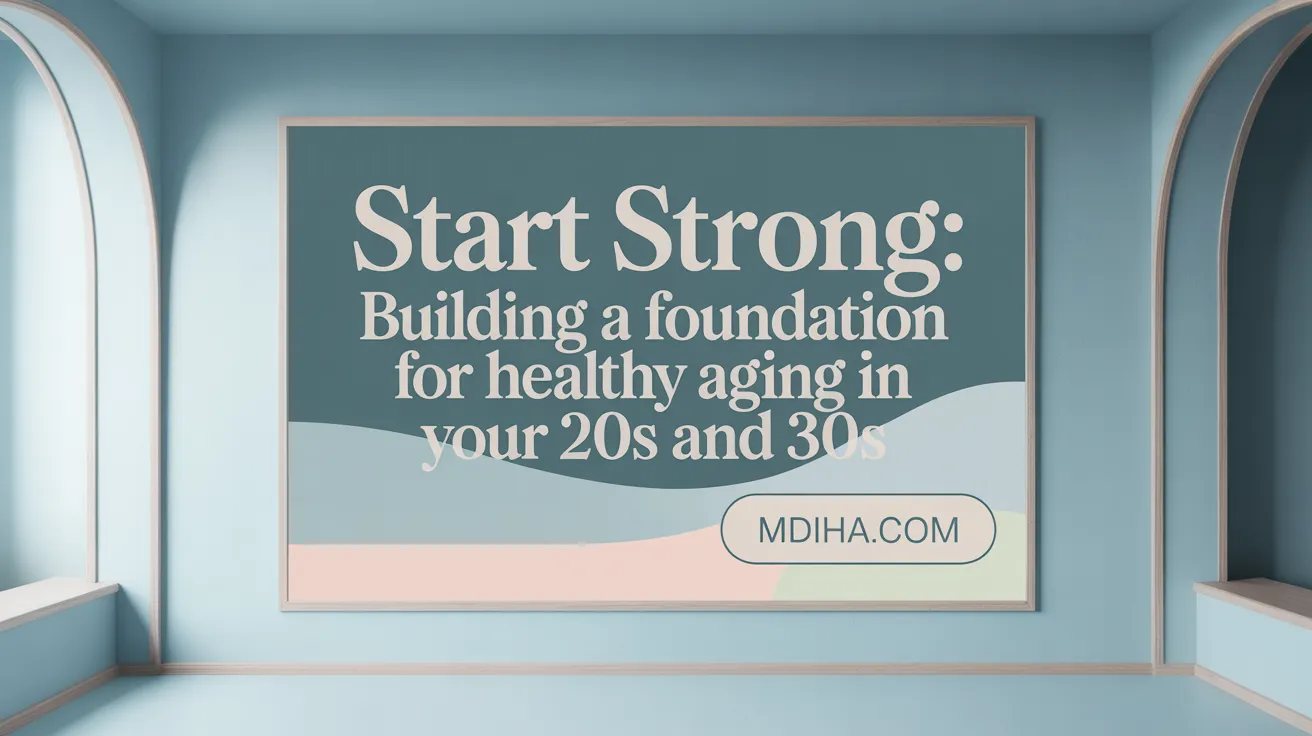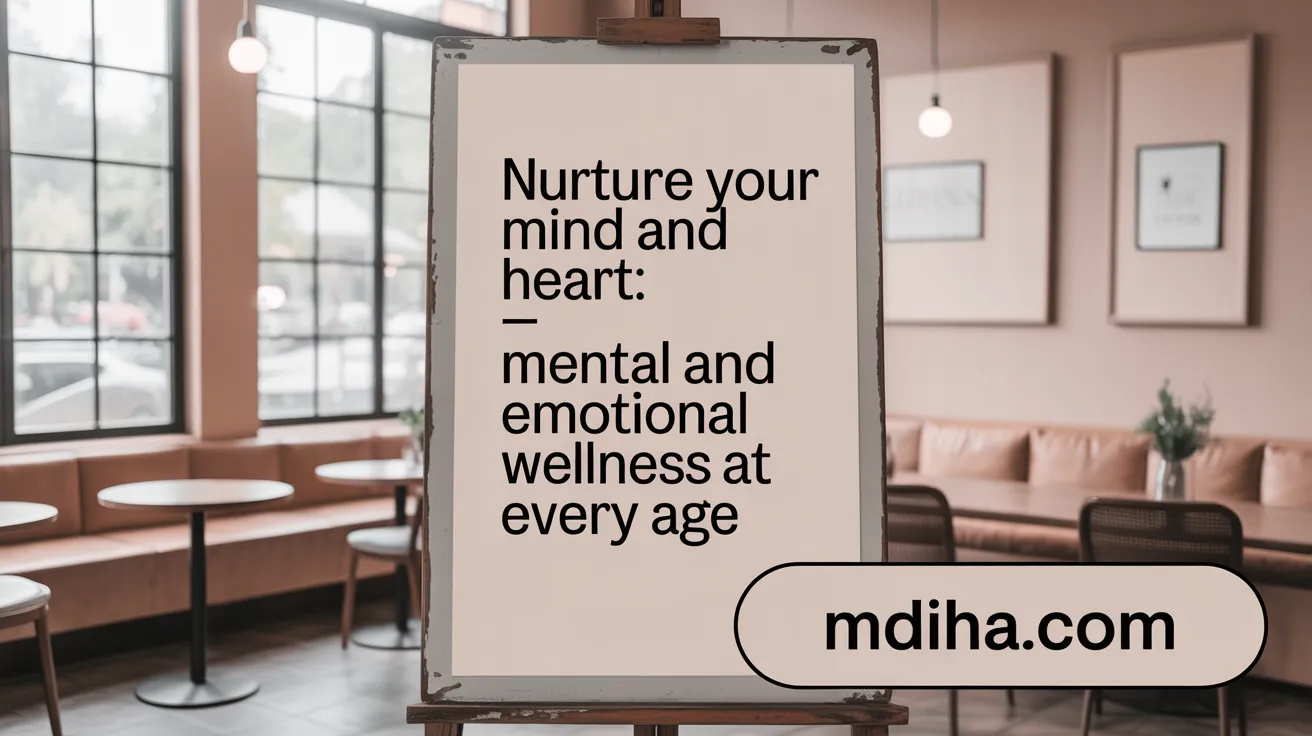Navigating the Journey of Healthy Aging
Healthy aging is a dynamic process that unfolds uniquely in each decade of life. Embracing scientifically supported strategies tailored to the distinct challenges and opportunities of each stage empowers individuals to maintain physical health, mental sharpness, and emotional well-being. This guide explores essential healthy aging practices aligned with life’s phases, from early adulthood through the senior years, encouraging proactive, personalized approaches to foster longevity and quality of life.
Foundations of Healthy Aging: From Early Adulthood to Your 30s

How can young adults establish healthy aging habits early on?
Starting healthy aging early involves building strong foundations with healthcare providers. Young adults should establish care with a primary provider and schedule routine checkups. These visits help identify risk factors and enable timely preventive care.
Nutrition plays a vital role; a balanced diet rich in fruits, vegetables, lean proteins, and whole grains supports overall health. Regular physical activity combining aerobic and strength training maintains fitness and bone health.
Mental well-being is equally important. Managing stress through meditation or relaxation techniques and nurturing social connections contributes to emotional health. Safe behaviors to prevent sexually transmitted infections and recommended screenings, such as Pap smears starting at age 21, are crucial preventive measures.
What unique health considerations arise in the 30s?
In your 30s, metabolism naturally slows, making weight management more challenging. Consistent aerobic activity and strength exercises help counteract this change.
This decade also marks a gradual decline from peak bone density, making weight-bearing exercises and sufficient calcium and protein intake essential to maintain bone strength.
Hormonal fluctuations, especially for women approaching perimenopause, can impact mood and energy levels. Awareness of family medical history aids in tailoring preventive strategies.
Balancing work, family life, and social or spiritual engagement supports mental resilience. Early adoption of these practices sets a course for healthier aging.
| Aspect | Young Adults (20s) | Adults in their 30s |
|---|---|---|
| Healthcare Routines | Establish primary care; routine checkups | Continue preventive screenings; tailor care |
| Nutrition | Balanced diet; whole foods | Focus on calcium, protein; manage metabolism |
| Physical Activity | Aerobic & strength training | Weight-bearing exercises to maintain bone density |
| Mental Health & Social | Stress reduction; cultivate connections | Balance roles; spiritual and social support |
| Screenings & Prevention | Pap smears from 21; STI prevention | Monitor family history; early screening |
Health Focus in Your 40s and 50s: Managing Change and Preparing for Longevity

What physical and hormonal shifts influence health in the 40s and 50s?
In your 40s and 50s, the body undergoes significant physical and hormonal changes that affect overall health. Women often experience perimenopause and menopause, resulting in symptoms like hot flashes, mood swings, and disrupted sleep. Both men and women see a decline in muscle mass alongside an increase in fat, making strength training and a protein-rich diet essential to maintain muscle and bone health. Additionally, cardiovascular risks grow due to shifts in cholesterol, blood pressure, and blood sugar levels. These changes highlight the need for heart-healthy eating habits and consistent physical activity. Managing increasing stress levels with mindfulness and relaxation techniques supports mental well-being during this transitional phase.
Which health screenings and preventive measures are critical during this period?
Preventive care is vital in the 40s and 50s to catch potential health issues early. Women should begin mammograms around age 40 and both men and women should start colon cancer screenings at age 45. Eye exams every two years can detect early vision changes, while regular checks for blood pressure, cholesterol, and blood sugar help monitor cardiovascular health. For individuals with lung cancer risk factors, lung cancer screening is advised. Understanding family medical history allows for personalized screening plans. Regular counseling on healthy diet and exercise choices, up-to-date vaccinations, and mental health assessments complete a comprehensive approach to preventive care in these decades.
How can diet and exercise be adapted in middle age?
Adapting your diet means focusing on nutrient-rich foods such as fruits, vegetables, whole grains, healthy fats, and lean proteins to support muscle, bone, and heart health. Incorporating resistance exercises like weight training helps build strength and prevent muscle loss. Aerobic activities such as walking or swimming improve cardiovascular fitness. Flexibility and balance exercises also contribute to mobility and fall prevention. Nutrition should emphasize adequate protein and calcium intake to support the body's changing needs.
What role does stress management and mental health support play?
Middle age often brings increased responsibilities that can elevate stress. Techniques like mindfulness, meditation, yoga, or journaling help reduce anxiety and improve mood. Maintaining social connections and engaging in meaningful activities can also bolster emotional health, while seeking professional support when needed is essential for managing symptoms of depression or anxiety.
Why is maintaining social engagement and a sense of purpose important?
Strong social ties and a sense of purpose enhance both mental and physical health. Staying connected through family, friends, clubs, or volunteering combats loneliness and promotes cognitive vitality. Having goals and meaningful involvement in community or personal interests contributes to satisfaction and resilience as you age.
Thriving in Your 60s and Beyond: Embracing Active and Engaged Aging

What physical activities support healthy aging in the senior years?
Older adults benefit greatly from a well-rounded exercise routine that includes aerobic activities like walking and swimming. Strength training, recommended twice a week, helps maintain muscle mass and bone density. Balance exercises such as tai chi and flexibility routines like yoga reduce the risk of falls and improve mobility. Incorporating warm-up and cool-down practices and gradually increasing activity levels minimizes injury risk. Social support in exercise, such as group classes, can boost motivation and mental well-being.
How do nutrition and preventive healthcare adapt for seniors?
Nutrition for older adults centers on nutrient-dense foods rich in potassium, calcium, vitamin D, vitamin B12, dietary fiber, and healthy fats, while limiting added sugars, saturated fats, and sodium. Hydration is vital as seniors often experience decreased thirst. Adequate protein intake supports muscle maintenance and overall health. Preventive healthcare involves regular screenings for blood pressure, various cancers, vision, hearing, and bone density to catch health issues early. Vaccinations against influenza, COVID-19, shingles, and pneumonia help protect from severe illness.
How can fall prevention and safety be enhanced?
Fall prevention is essential in older age and includes home safety assessments to remove hazards, routine vision checks, and medication reviews to avoid side effects that increase fall risk. Balance exercises and strength training support physical stability. Wearing appropriate footwear and ensuring well-lit environments also contribute to safety.
Why are mental stimulation and social connectedness important?
Engaging in mentally stimulating activities like puzzles, reading, and learning new hobbies delays cognitive decline. Social connections through family, friends, clubs, and volunteer work reduce loneliness, improve emotional health, and support brain function. A purposeful social life enhances quality of life and resilience in later years.
What regular health screenings and vaccinations should seniors prioritize?
Seniors should schedule routine check-ups that monitor blood pressure, cholesterol, diabetes, cancer screenings (such as breast, colon, and prostate), vision, hearing, and bone density tests. Staying updated with vaccinations for flu, COVID-19, shingles, and pneumonia decreases vulnerability to infections and complications.
| Focus Area | Recommendations | Benefits |
|---|---|---|
| Physical Activity | Aerobic, strength, balance, flexibility exercises | Maintains mobility, reduces falls, boosts mood |
| Nutrition | Nutrient-dense diet, hydration, adequate protein | Supports muscle, bone, immune health |
| Mental & Social Health | Cognitive activities, social engagement | Delays decline, enhances emotional well-being |
| Fall Prevention | Home safety, vision checks, medication review | Reduces injury risk, maintains independence |
| Health Screenings | Blood pressure, cancers, vision, hearing, vaccinations | Early detection, infection prevention |
Mental and Emotional Wellness Across the Lifespan

How does emotional and mental health impact healthy aging?
Maintaining mental and emotional health is crucial for aging well. Social engagement for older adults at all ages helps prevent feelings of loneliness and depression, which are linked to cognitive decline and heart disease. Regular interactions through calls, group activities, or community involvement build emotional resilience and a sense of belonging.
Stress management is another essential element. Techniques such as meditation, yoga, journaling, and engaging in hobbies help reduce anxiety and stress-related physiological effects. These practices also support brain and cardiovascular health by lowering harmful stress hormone levels.
Cognitive stimulation plays a vital role in preserving mental sharpness. Activities like puzzles, learning new skills, reading, or exploring new hobbies stimulate brain function and may delay dementia onset.
Emotional health requires addressing depression actively. Depression is common in older adults but is not a normal part of aging. Early recognition and professional treatment can improve quality of life significantly.
Finally, cultivating a positive mindset and living with purpose enhance mental well-being. Embracing mindfulness, acceptance, and meaningful social roles contributes to happiness and life satisfaction in later years. Having a sense of purpose, often described as "Ikigai" or personal reason for living, supports emotional stability and resilience throughout the aging process.
Tailored Preventive Screenings and Healthcare Across Decades
What are key preventive healthcare actions for different age groups?
Preventive healthcare is a dynamic process that adapts to the needs of each life stage to maximize health and catch potential issues early. For young adults, particularly women, cervical cancer screening with Pap tests begins at age 21 and is continued with routine STI screenings and HPV vaccinations. These measures help prevent reproductive health issues and maintain sexual health.
As individuals enter their 40s and 50s, focus shifts to screenings like mammograms starting around age 40, colonoscopy starting at 45, and regular checks for cholesterol and diabetes to manage cardiovascular risk. Men may also begin prostate cancer screenings depending on risk factors. It is key to maintain routine health care visits during this time for early detection and lifestyle counseling.
In older adults, screenings become more comprehensive and personalized. Lung cancer screening is recommended for high-risk individuals aged 50 and above. Women over 65 are advised to have bone density tests to assess osteoporosis risk. Seniors benefit from yearly wellness exams to monitor chronic conditions and assess medication use. Vaccinations play an essential role at all ages, with annual influenza and COVID-19 shots advised for all adults, alongside shingles and pneumonia vaccines particularly for seniors.
Managing chronic conditions early through open communication with healthcare providers ensures timely intervention and medication safety. Personalized healthcare approaches, taking into account family history, genetics, and lifestyle, improve health outcomes by tailoring prevention strategies.
Regular, age-specific preventive care including screenings, vaccinations, and chronic disease management supports healthier aging and quality of life across all decades.
Holistic Lifestyle Practices for Healthy Aging: Insights from Global Studies

What holistic lifestyle factors contribute to healthy aging worldwide?
Global studies, especially research from Blue Zones and longevity, provide valuable lessons on living longer and healthier lives. These areas, known for their exceptionally high longevity rates, reveal several key lifestyle habits:
-
Diet: Emphasizing a Mediterranean-style diet advantages rich in fruits and vegetables for health, whole grains, nuts, olive oil, and lean proteins has been shown to support heart and brain health. This plant-based diets for longevity eating approach helps reduce the risk of chronic disease risks and improves cellular function.
-
Physical Activity: Regular moderate exercise such as walking, gardening, and other natural movements improves mobility, enhances balance, and lowers the risk of many age-related diseases. The routine engagement in physical activity to lower disease risks is common among older adults in these regions. Activities include aerobic and strength exercises, balance and flexibility exercises, and 150 minutes of aerobic activity weekly.
-
Social Connections: Strong social networks and a deep sense of community belonging are crucial. These supportive relationships foster emotional well-being, prevent reducing social isolation and loneliness, and promote social engagement for older adults.
-
Stress Reduction and Sense of Purpose: Managing stress through meditation and relaxation techniques or mindfulness and maintaining a clear life purpose — often referred to as 'ikigai' and healthy aging — contribute significantly to both longevity and quality of life.
-
Mental Engagement: Continuous learning, trying new activities, and mentally stimulating tasks help delay cognitive decline and maintain brain health. Mental activities such as puzzles and reading support cognitive benefits of Mediterranean diet and overall brain health.
Taken together, these elements form a comprehensive lifestyle blueprint that encourages not only longer life but also vibrant and meaningful aging. Implementing these interconnected practices underscores the importance of nourishing body, mind, and social bonds throughout the human lifespan.
Embracing a Personalized Path to Healthy Aging
Healthy aging is not a one-size-fits-all journey but a personalized and evolving process guided by the unique challenges and opportunities of each decade. By embracing age-specific strategies — from establishing strong health habits in youth, managing midlife transitions with informed care, to cultivating vitality, mental agility, and social connections in later years — individuals can optimize their physical, cognitive, and emotional health. Integrating preventive healthcare, a nutritious diet, regular physical activity, meaningful social engagement, mental stimulation, and stress management forms a robust foundation for longevity and a high quality of life. Inspired by global longevity insights and tailored medical guidance, this multidimensional approach empowers all ages to navigate aging with resilience, purpose, and joy.
